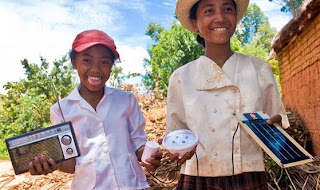One in four of the world’s population has no access to electricity. This not only holds them back, reducing their quality of life and their chances of breaking free of the poverty trap in which they find themselves, but it is also dangerous as they attempt to heat and light their homes using alternative methods, such as kerosene. Kerosene gives off noxious fumes which make people ill and cause respiratory problems, and it is a huge fire risk. A house fire is a devastating event anywhere in the world. In the overcrowded slums of developing countries, it could lead to catastrophic loss of life.
Other methods of supplying power are no better. Small car batteries are used to power radios and maintain contact with the outside world. But these last a very short time, and they contaminate the water supply. Candles are ineffective, expensive and dangerous.
In our previous blog post, we mentioned a UK company that is working to provide a clean, cheap and viable alternative source of energy. ToughStuff uses solar power to bring energy to some of the poorest people on earth, improving living standards, saving money and increasing the life chances of those people.
A small and portable panel provides enough energy to light a home and charge a mobile phone. The panel is certainly tough, as this short video shows: http://www.youtube.com/watch?feature=player_profilepage&v=m4iqzAmVqFA. This means it can be used anywhere, in any circumstances, from the grinding poverty of a Kenyan slum to displacement camps in Uganda, to emergency situations. Children can safely complete homework assignments, their parents can work after dark, and since local businesses can be used to supply the products, it also helps the local economy and employment situations. It’s cheap, it’s clean and it’s simple.
On 1st May, World In Need in Northern Uganda will welcome a team from ToughStuff. Based in Kampala, the team will visit Lira where they will train people to use the product and to teach others how to use it, as well as how to set up small businesses around it.
For the people of Lira, this is a step on the long journey to a better life, and we look forward to making that journey with them.
If you would like to know more about this aspect of World In Need’s work, or you’d like to be part of this project, please contact us at info@worldinneed.co.uk


